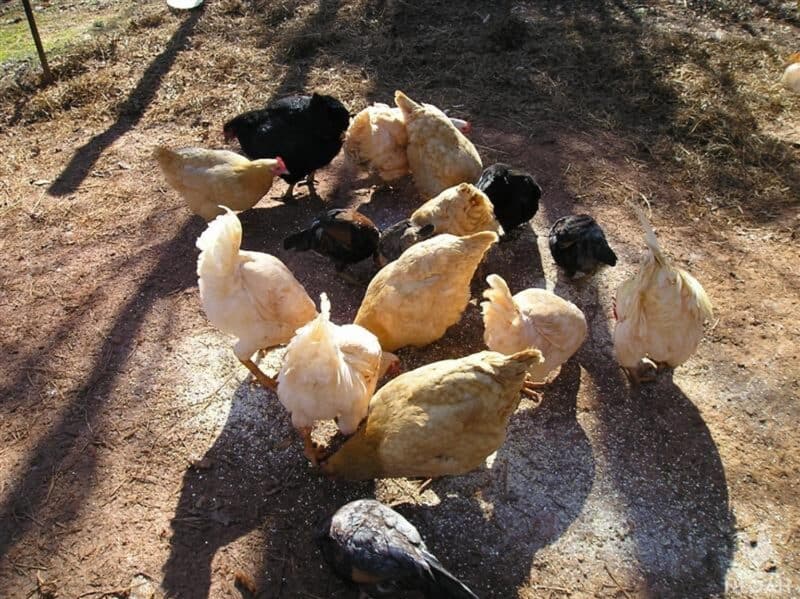Chickens are highly adaptable eaters, omnivores that enjoy both plants and meat in their diet. Most owners already know that you can feed all sorts of things to a chicken, and they will gobble them up happily.

But like every animal, there are some things they should never eat. How about holly bushes? Can chickens eat holly?
No, chickens should not eat any part of the holly plant. All parts of the holly plant contain a variety of compounds that are toxic for chickens, including caffeic acid, chlorogenic acid, tannins, caffeine and theobromine.
They’re all sorts of things that chickens can eat that people and other animals can’t, but as it turns out some plants just aren’t good eating for any living thing it seems.
Holly is certainly beautiful, but it is one of them. Keep reading to learn what you need to know about this festive but toxic plant.
Can Chickens Eat Holly Raw?
No. Chickens should not eat any part of the holly plant, raw or not. All parts of the holly plant contain the aforementioned variety of compounds that are toxic for chickens, including caffeic acid, chlorogenic acid, tannins, caffeine and theobromine.
Can Chickens Eat Holly Berries?
Chickens should never eat holly berries in particular. Many of the toxins are concentrated in the berries, which can be very tempting for chickens since they are often a bright red color.
Eating just a single berry can make a chicken very ill, and eating several will almost certainly be fatal.
Can Chickens Eat Holly Leaves?
No. Holly leaves don’t contain nearly as many toxins as the berries, they are still harmful and toxic enough to cause harm.
Can Chickens Eat Holly Roots?
No! Holly roots are nearly as toxic as the berries and should never be fed to chickens, nor should they be allowed to graze on them.
Can Chickens Eat Holly Cooked?
No. Cooking does nothing to significantly reduce the toxicity of holly even though a few particular compounds could be affected.
Plenty of others that are present in all parts of the plant won’t be, so cooking is not a way to make it safe to eat.
Chickens should not eat any part of the holly plant, raw or cooked.
Effects of Holly Toxicity on Chickens
Holly plants are beautiful, with their glossy green leaves and bright red berries. But all parts of the holly plant contain multiple compounds, including theobromine, that are harmful or deadly for chickens.
These compounds are known to cause severe digestive and stomach issues, dehydration, vomiting, and diarrhea if ingested in small quantities, but can cause lowered heart rate, agitation, seizures and death from a larger dose.
What Should You Do if Your Chickens Eat Holly?
Holly berries are especially dangerous because they are so tempting to eat. If your chickens happen to partake of some holly berries, don’t panic.
The toxin load of each individual plant and berry is quite variable, and it is possible that your chickens will suffer no more than some digestive upset.
Symptoms of mild holly poisoning in chickens include vomiting, diarrhea, and diminished appetite.
If you notice these symptoms only, simply isolate the affected chicken and offer it some bland food and water. In most cases, the chicken will recover within a day or two and be back to its normal self.
However, if the symptoms persist or seem worse than what is detailed above, contact a veterinarian at once for further guidance. Rapid intervention is always vital for saving the life of a poisoned bird.
Baby Chicks are Especially Vulnerable to the Toxins in Holly Plants
While all chickens are at risk of holly poisoning, baby chicks are especially vulnerable. This is because their digestive systems and body are not yet fully developed, and their lower overall mass makes them far more vulnerable to toxins.
If you have baby chicks, it is best to remove any holly plants from their immediate environment or fence off the holly plants to minimize the risk of them.
Protecting Your Flock from Holly Plants
Holly poses a risk to chickens if they ingest any part of the plant, but it is not usually counted among the most dangerous plants your chickens could interact with.
In fact, most chickens seem to instinctively avoid holly. However, there will usually be one or two curious birds that want to try it, or else ones that have developed a taste for berries that are attracted to its alluring, red fruits.
In such cases or for an abundance of caution, the best way to protect your flock from holly poisoning is to simply remove any holly plants from their environment.
This can be difficult if you have holly trees or bushes on your property, but in that case you can fence them off so your chickens cannot get to the leaves or berries.
Tom has lived and worked on farms and homesteads from the Carolinas to Kentucky and beyond. He is passionate about helping people prepare for tough times by embracing lifestyles of self-sufficiency.
